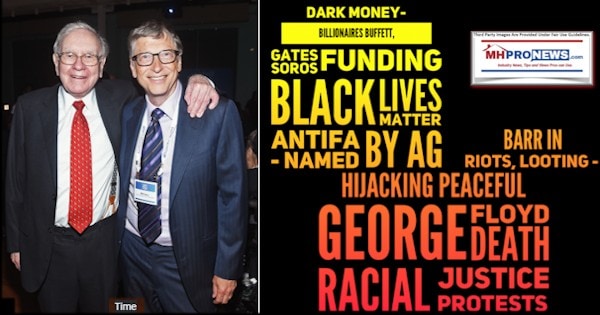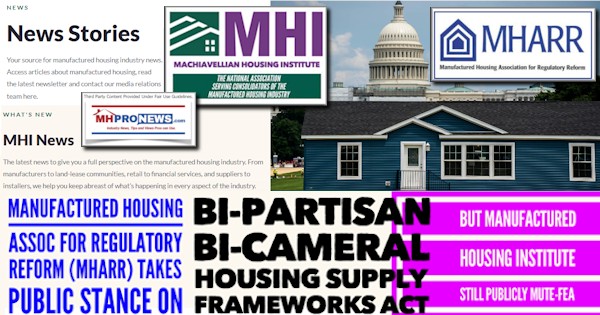Was the Washington, D.C. based Manufactured Housing Association for Regulatory Reform (MHARR) correct in publicly ripping the much larger and far better funded Arlington, VA based and Berkshire Hathaway backed Manufactured Housing Institute (MHI)?
Let’s see what MHARR said, which will be followed by an MHProNews analysis and Commentary.
Manufactured Housing Association for Regulatory Reform
November 20, 2020 Washington Update — An Exclusive Report and Analysis
INDUSTRY’S CONTINUING POST-PRODUCTION FAILURES CAUSE FOR ALARM
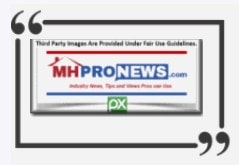
Since the early 1990s, the manufactured housing industry’s critical post-production sector has not been represented at the national level by an independent, sector-dedicated and sector-focused membership organization. Instead, representation of this key segment of the industry has been subsumed since that time within a mere “division” of the Manufactured Housing Institute (MHI). And while MHARR – which exclusively represents industry manufacturers – and MHI were successful years ago in bringing about these two highly-beneficial laws, MHI has subsequently allowed their significant post-production aspects to languish, and even worse, has failed to stop their misuse and abuse by federal government regulators and others (see, articles below) to the detriment of both the industry’s smaller, independent businesses and American consumers of affordable housing, as evidenced by prevailing circumstances.
Together and in combination, these post-production failures have the effect of excluding millions of lower and moderate-income Americans from accessing affordable homeownership via manufactured housing, and from living, in a manufactured home, where they would prefer. The end result, ultimately, is needless homelessness, a lack of affordable homeownership opportunities for many, and a severe repression of manufactured housing production at levels far below historic norms, as previously documented by MHARR.
Consequently, while MHARR was successful in convincing HUD to the conduct the currently-pending study of discriminatory zoning and its impacts on manufactured housing, and while regulatory and enforcement issues within the HUD manufactured housing program, during the Trump Administration, have been constrained to some degree, the benefits resulting from those positive developments have been offset by the aforesaid ongoing and worsening problems within the post-production sector, where consumers, absent federal preemption by HUD under the 2000 reform law are not only restricted from placing manufactured homes by baseless, discriminatory zoning restrictions, but the non-implementation of DTS for well over a decade has sustained a less-than-fully-competitive manufactured housing consumer finance market, dominated by a handful of “portfolio” lenders. This less-than-fully-competitive market drives the overwhelming majority of manufactured housing consumers (approximately 90% according to a recent Freddie Mac report) to lenders charging higher-rate interest, many if not most of which are affiliated with the industry’s largest corporate conglomerates. These conglomerates, at the same time, are virtually the only industry entities to benefit from the unreasonable requirements that have been placed on DTS support for manufactured homes titled as real estate under Fannie Mae and Freddie Mac’s “MH Advantage” and “ChoiceHome” programs. Such “double-dipping” by the industry’s largest conglomerates and their finance affiliates, was not intended by Congress under DTS and must be substantively reformed.
Again, the prevalence and persistence of such failures within the post-production sector is, in substantial part, a function of the lack of an independent national representative for that sector, to aggressively advance its interests and join MHARR’s effort to advance the broader interests of all industry segments. (Much more on this to come soon.) Instead, the distinct and significant interests of the post-production sector appear to be constantly subsumed by and subverted to the interests of the industry’s largest corporate conglomerates, which tend to dominate the industry’s other representative groups in much the same manner that they dominate the manufactured housing market as a whole. Thus, the interests of those conglomerates – such as their support for special treatment of the “hybrid” homes they manufacture under DTS – is steadily advanced by MHI, while the broader interests of the post-production sector in full, market-significant DTS support for mainstream manufactured housing and an end to (or amelioration of) discriminatory zoning and placement restrictions, among other things, make little or no discernible progress.
Specifically because of this failure, MHARR will continue to maintain and, in fact, intensify, its aggressive focus on both consumer financing and discriminatory zoning, in order to seek remedies that will benefit the entire industry and all manufactured housing consumers, as it also seeks significant and lasting regulatory reform within the federal manufactured housing program regardless of which party ultimately wins control of the White House.
##
Additional Information, MHProNews Analysis and Commentary
Note that in that last line, MHARR has not ‘called’ the presidential race, just as gamblers on the 2020 presidential race have reportedly not yet been paid. The reason is simple. The matter is still very much in question. While the playing field may favor the Democratic candidate, Obama-era Vice President Joe Biden, yesterday’s press conference by the Trump legal team makes it clear that there are still several legal paths for 4 more years of the Trump presidency.
By contrast, the Manufactured Housing Institute (MHI) once more followed the lead of their corporate masters by putting their thumb on the scales, perhaps more so than in the 2016 contest.
An always relevant question is cui bono? Who benefits from the status quo? That is the question that law enforcement and serious media routinely ask to see why something is as it is.
Why is the status quo of over 15 years of historically low levels of manufactured housing industry production tolerated at the Manufactured Housing Institute (MHI)? The case can be made that it is because larger firms that are the powerbrokers at MHI benefit through a long-term strategy that keeps results low, which slowly erodes the viability of smaller companies. That process makes consolidation at discounted valuations more common.
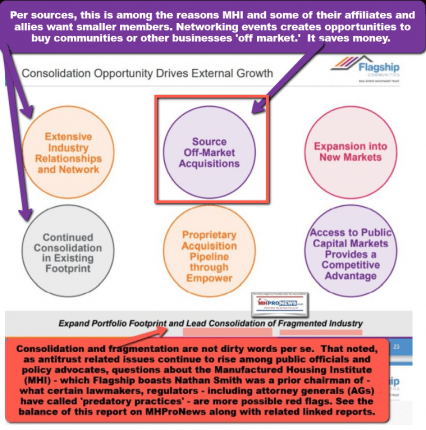
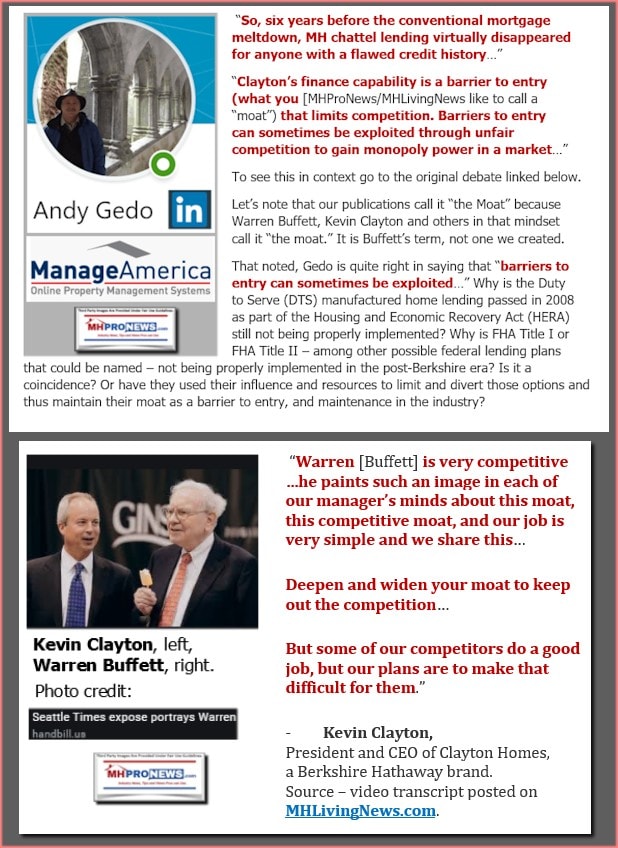
Additionally and related is the notion that corporations like Berkshire Hathaway owned 21st Mortgage and Clayton Homes benefited during the Obama Administration through more regulations that obliquely favored big companies vs. smaller ones.
That is the impact of arguments made by experts such as Carol Roth.
The point of the Manufactured Housing Improvement Act (MHIA) of 2000 and the Duty to Serve manufactured housing (DTS) mandated by the Housing and Economic Recovery Act (HERA) of 2008 was to simplify and clear out the regulatory miasma. But tips from inside MHI that reveal that Tim Williams, former MHI chairman and the CEO of 21st, makes it clear that they had no desire to see DTS implemented.
That shocking statement by Williams – shocking to any who have any level of trust in MHI and their leadership – should be one more element in the puzzle that is spelled out in the recent report and analysis published below.
Foot Dragging? Rigged System? Manufactured Housing Lending Comments to Feds by Various Professionals
MHARR has been spotlighting and pressing these issues for years, essentially fighting not only regulators, but also the powers behind MHI.
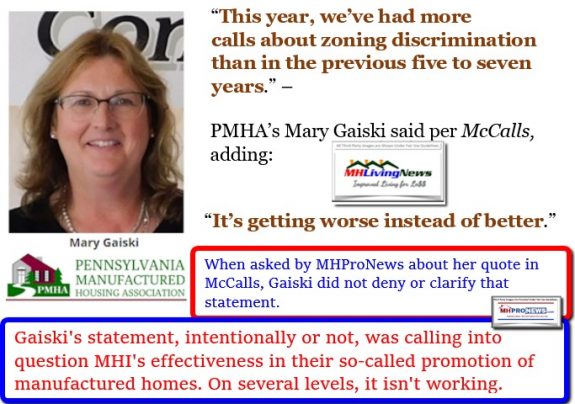
These are issues that MHARR pushes. But others, beyond MHProNews or MHLivingNews, that claim that they are ‘trade media’ routinely fail to address. Are they ‘reporters’ or merely mouthpieces for the powers that be in the industry?
Why is that they don’t have any intellectual curiosity as to why the industry is snoring while conventional housing is soaring?
The bottom line from the headline question? Of course, MHARR’s publicly ripping MHI makes sense. After all, MHI claims to be the post-production leaders. The evidence of MHI’s problematic behavior – and that of their corporate masters – is self-evident once the industry is properly understood.
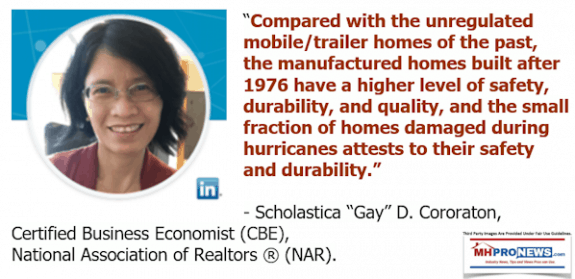
See the related reports shed added light on these issues.
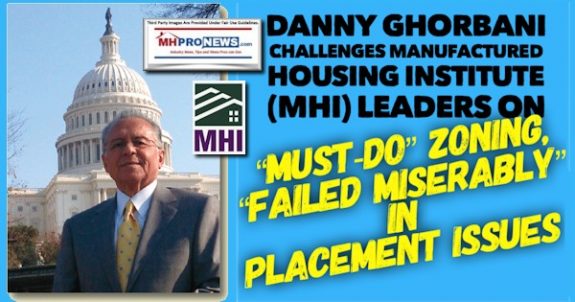

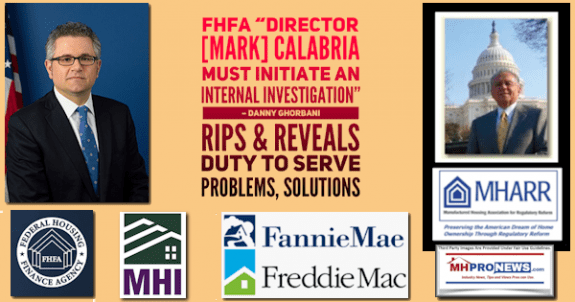
There is always more to read and more to come. Stay tuned with the runaway number one source for authentic “News through the lens of manufactured homes and factory-built housing” © where “We Provide, You Decide.” © ## (Affordable housing, manufactured homes, reports, fact-checks, analysis, and commentary. Third-party images or content are provided under fair use guidelines for media.) (See Related Reports, further below. Text/image boxes often are hot-linked to other reports that can be access by clicking on them.)

By L.A. “Tony” Kovach – for MHProNews.com.
Tony earned a journalism scholarship and earned numerous awards in history and in manufactured housing.
For example, he earned the prestigious Lottinville Award in history from the University of Oklahoma, where he studied history and business management. He’s a managing member and co-founder of LifeStyle Factory Homes, LLC, the parent company to MHProNews, and MHLivingNews.com.
This article reflects the LLC’s and/or the writer’s position, and may or may not reflect the views of sponsors or supporters.
Connect on LinkedIn: http://www.linkedin.com/in/latonykovach
Related References:
The text/image boxes below are linked to other reports, which can be accessed by clicking on them.

